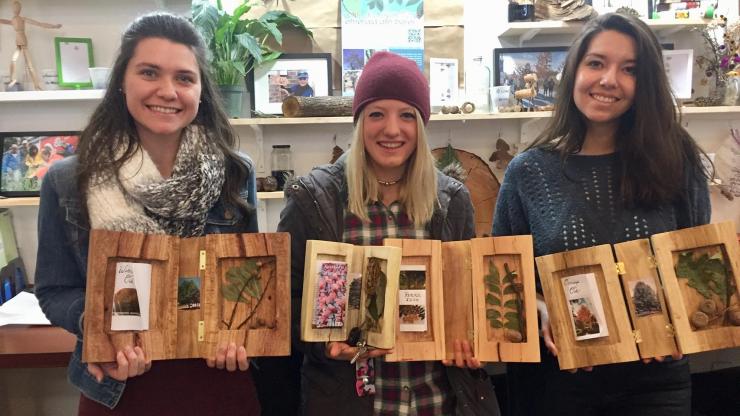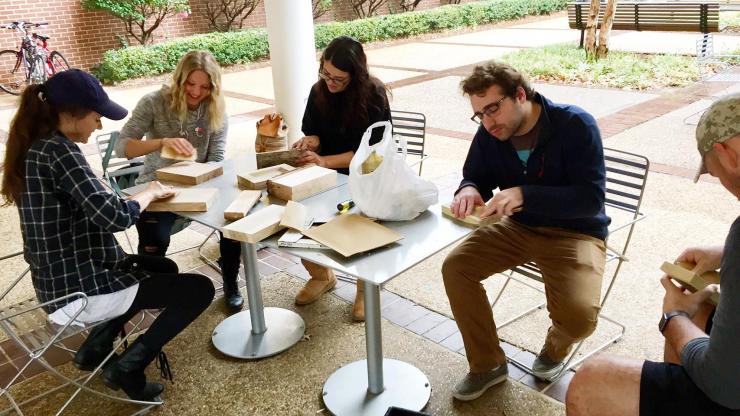If the Trees Could Speak
Dec 21, 2017 — Atlanta, GA

Xylotechques built by Seminar in Science, Technology, and Culture students for Trees Atlanta in December 2017. The xyloteches — specimen books built from the wood, bark, leaves, and other materials of a particular tree — will be used by the non-profit to help educate Atlanta youth about the need to care for the environment.
Atlanta’s trees have a story to tell, and they recently got a boost from some Georgia Institute of Technology students who are determined to help.
The students, part of the Fall semester senior-level Seminar in Science, Technology, and Culture course, recently presented non-profit Trees Atlanta with a set of special books made from the wood, bark, leaves, and other materials from specific tree species.
The books are called “xylotechques,” and will help teach children about the importance of trees as plants in our environment and culture, said Hugh Crawford, a professor in the School of Literature, Media, and Communication (LMC) who taught the seminar. The School is a unit of the Ivan Allen College of Liberal Arts.
Trees Are Crucial Environmentally and Culturally
“Trees in addition to affecting and defining specific natural environments enable a range of human social and cultural formations,” Crawford said. “Where would England be without the oak? Or the rural American Southeast without longleaf pine?”
Similarly, Atlanta has long drawn identity from its wealth of trees. Yes, the city has lost much of that canopy to development in recent decades. Student Zachary Butner said such losses highlight issues that Georgia Tech is in a great position to help address.
“What Atlanta needs on sustainability is two-fold: education and technology, which sounds a lot like GT to me,” he said.
What Is a Xyloteque?
Xylotechques aren’t books in the traditional sense. Instead of cloth or leather covers, they feature covers made of the wood and bark of a particular tree. Instead of pages inside, they have pockets inside that feature specimens from the trees and, in the case of the Georgia Tech xylotechques, a brochure about the species. They have a long history dating back to 17th Century Europe, according to online accounts.
The versions made by Georgia Tech students came from downed trees. The xylotechques will be used by youth attending Trees Atlanta programs at the Treehouse, the group’s environmental education and research center.
The Project Helped Craft a New Perspective for Students
Jessica Shamus, who graduated with a degree in Literature, Media, and Communication on Saturday, December 16, 2017, said the seminar and the ensuing project helped give her a new perspective on the environment.
“Since most people go to college because they think it’ll help them get a better job, there is a culture of progress, success, and moving forward,” she said. “Often, people associate this with new buildings, city growth, and prosperous companies. It is important for students to learn the significant roles plants and animals play in our giant ecosystem before they get completely sucked into an urban mindset.”
Butner, a fifth-year mechanical engineering student who has a job lined up in the automotive industry after graduation, said that Crawford’s course “changed my worldview.”
“You’d think that field [automotives] is pretty far away from the natural world, but everything man-made can be traced back to the energy and material required, both of which come from the natural world. Even the labor required is affected by the natural world. This class has taught me the importance of tracing it back.”

Georgia Institute of Technology students Jessica Shamus, Marinice Bauman, Katherine Sanz with xylotechques built for Atlanta non-profit Trees Atlanta in December 2017. The three helped build the wooden specimen books as part of the Seminar in Science, Technology, and Culture course in the School of Literature, Media, and Communication.

Georgia Institute of Technology students Jessica Shamus, Marinice Bauman, Libby Galli, Zach Butner, and Jake Stickler work on xylotechques to be presented to Trees Atlanta in December 2017. The students created the wooden specimen books as part of the Seminar in Science, Technology, and Culture in the School of Literature, Media, and Communications.
with xylotechques built for Atlanta non-profit Trees Atlanta in December 2017. The three helped build the wooden specimen books as part of the Seminar in Science, Technology, and Culture course in the School of Literature, Media, and Communication.
Rebecca Keane
Director of Communications
rebecca.keane@iac.gatech.edu
404.894.1720




